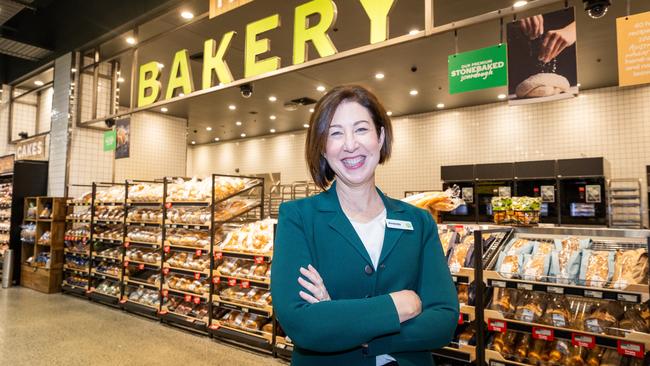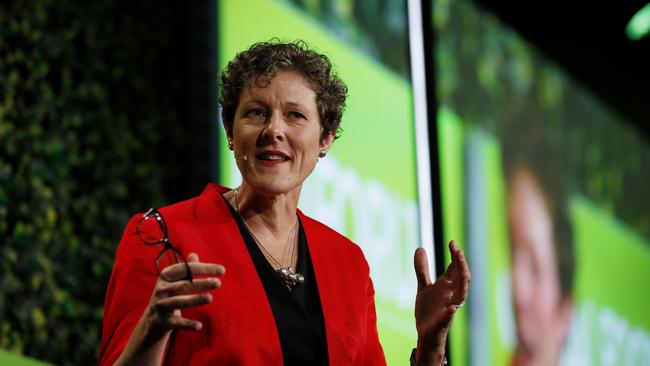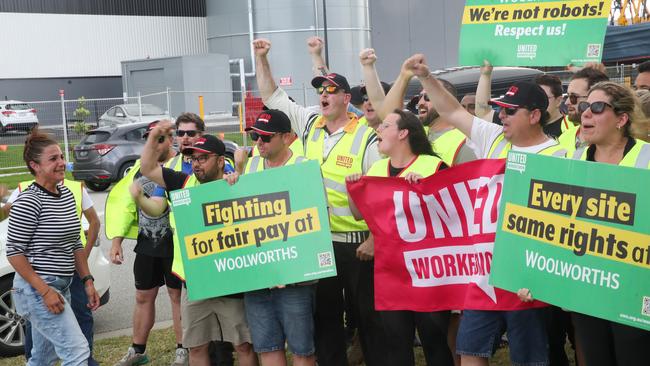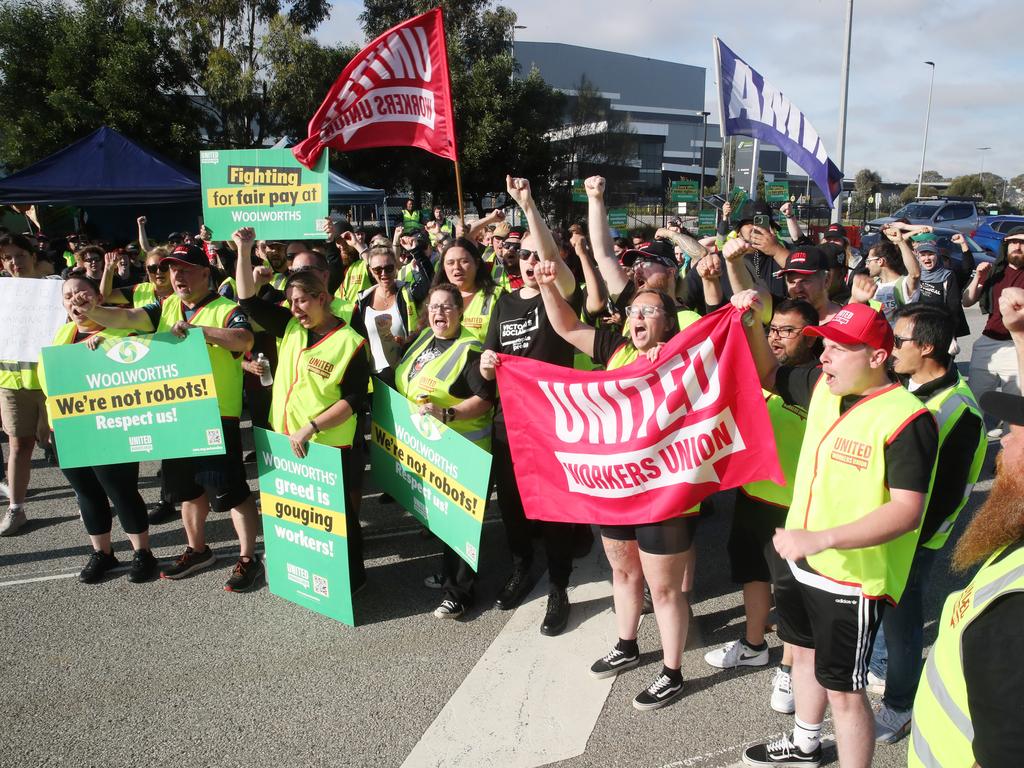Food and grocery suppliers pledge support to Woolworths CEO Amanda Bardwell over strike action
Food and grocery suppliers have offered to bypass strike workers and deliver goods direct to Woolworths stores so supermarket shelves can be filled in time for Christmas.

The nation’s food and grocery suppliers have written to Woolworths CEO Amanda Bardwell offering to bypass strike workers and deliver goods direct to stores so supermarket shelves can be filled in time for Christmas.
The suppliers – whose products are being held captive by union picket lines outside Woolworths distribution centres – wrote to Ms Bardwell to express their support, and warned that capitulation to 25 per cent wage rise demands without productivity gains would fuel inflation and worsen the cost-of-living crisis for households.
The Australian Food and Grocery Council in a letter to Ms Bardwell, obtained by The Australian, has expressed its alarm over the excessive wage demands of warehouse workers and the United Workers Union that it believes will only serve to ratchet up the cost of supply chains, with consumers paying the price in terms of steeper shopping bills.
And in an offer that could turn union ire onto the suppliers, the council has told Ms Bardwell it would encourage its members – food and grocery manufacturers and brands – to work with the supermarket to deliver goods direct to stores, effectively bypassing the picket line.
“As committed to you, the AFGC will work with and encourage our members to collaborate with Woolworths wherever it can to provide solutions such as direct to store deliveries to ensure that essential products can continue to be supplied to consumers and that our own supply chains can continue to operate without disruption at this critical time of year,” the letter said.

Many food and grocery suppliers were reluctant to speak publicly to The Weekend Australian about the strike and the excessive, above-inflation wage demands, fearful that increasingly militant unions would quickly turn their industrial muscle to their own operations, warehouses and supply chains. Instead, their industry body is acting.
Lining up behind Woolworths and its CEO of only 13 weeks, it has called the retailer’s stand in the face of militant union pressure “brave”.
Following a briefing by Ms Bardwell and Woolworths chief commercial officer Paul Harker to the AFGC board on Friday, the industry group representing the $130bn food manufacturing industry has taken the unprecedented step to write a letter of support to the Woolworths CEO. The morning briefing was held as Woolworths and the unions faced off in the Fair Work Commission.
Despite many battles between suppliers and the supermarket industry over the years and sometimes bitter public arguments between the AFGC on behalf of its members and Woolworths and Coles, the industry body representing manufacturers has given full support to Woolworths in its industrial dispute with the United Workers Union.
The empty shelves across Woolworths stores has cost the retailer $50m in lost sales over the past two weeks, and it is causing major headaches for suppliers as their products are disappearing from the shelves of the nation’s largest supermarket chain and, for many, their most important sales channel. That and fears of a wages explosion to threaten supply chain costs and higher inflation has now triggered a strong response.

The AFGC is led by Tanya Barden and its board of directors include representatives of some of the world’s biggest food and grocery suppliers such as McCain Foods, McCormick Foods, Bulla Dairy, Mondelez (which owns Cadbury), Asahi Beverages, Patties, Kimberley-Clark and Kellanova (formerly known as Kellogg’s).
Still wearing the scars of years of rising inflation that ran rampant through their supply chains and businesses, the suppliers have told Ms Bardwell to hold firm in the face of union wage demands of 25 per cent rises over three years. Its letter warned that without ongoing productivity within all supply chains the ability to mitigate inflation would be “severely compromised”, affecting consumer affordability.
“As a board, we also fully support the principle that negotiated wage outcomes need to be realistic and responsible particularly in an environment where a business is already paying well above the award. Agreement to excessive wage demands will ultimately impact and harm consumers in the form of increased prices and put further inflationary pressure into an already difficult cost and price environment.”
“Thank you again for the briefing you provided this morning. As an industry, we appreciate the brave stand Woolworths is taking in defence of fundamental principles of productivity and consumer affordability.
“The flow on effects across the food and grocery supply chain if Woolworths simply agreed to the demands being placed upon it in the current dispute would be highly inflationary and lead to ongoing escalation of costs well into the future … this would be a very bad outcome for the industry and for all Australians.”
Last month the peak body representing food and grocery manufacturers raised concerns over mounting cost pressures on the food industry in its response to the Australian Competition & Consumer Commission’s interim report for its inquiry into supermarket pricing.
Recent data shows that rising costs are eroding industry profits, the AFGC warned, and that although some costs, including some commodities, energy, and shipping have slightly moderated, they continued to be above pre-Covid levels and other costs were increasing.
Over the past three years energy and gas costs have gone up by more than 50 per cent, sugar is up 46 per cent and some packaging is about 30 per cent more expensive, the AFGC said.
“In addition, the increased costs of energy and labour are having a significant bearing on manufacturing, as are government regulation and the costs associated with the sector’s transition to a circular economy and clean energy. These factors continue to drive supply side inflation for food and grocery products.”







To join the conversation, please log in. Don't have an account? Register
Join the conversation, you are commenting as Logout